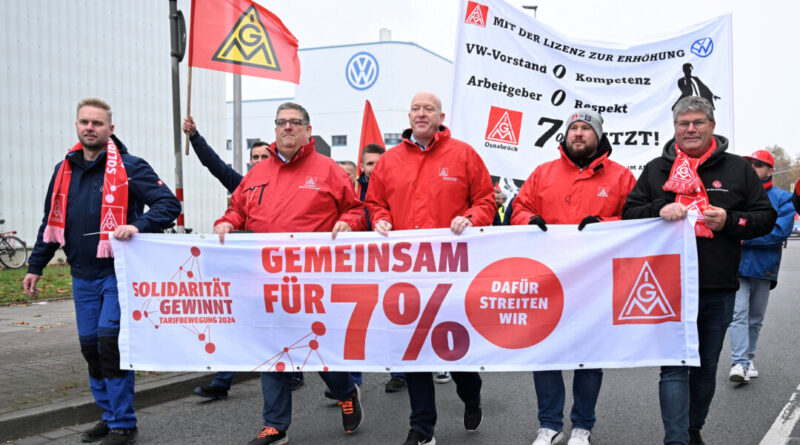Germany Sees Volkswagen Workers Go on Strike due to Wage Reductions in Response to Chinese Electric Vehicle Competition
Volkswagen is currently implementing a 10 percent wage cut and has announced the closure of multiple sites in Germany for the first time in its 87-year history.
Workers at nine Volkswagen car and component plants across Germany have initiated strikes as the company navigates the shift to electric cars and competition from China.
On Dec. 2, thousands of workers gathered at the Volkswagen headquarters in Wolfsburg to protest over wages and job cuts. The strikes may escalate into 24-hour or indefinite stoppages if an agreement is not reached in the upcoming rounds of negotiations.
Demonstrations have also occurred at the Hanover plant, which employs around 14,000 individuals, as well as at other component and auto sites, including Emden, Salzgitter, and Brunswick.
$11 Billion
Earlier this year, Volkswagen, Germany’s largest industrial employer and Europe’s leading carmaker by revenue, announced plans to achieve $11 billion in savings by 2026 to adapt to the transition to electric cars in the face of competitive pressure from China. The company is also grappling with significant challenges related to high energy costs.
Under pressure, Volkswagen decided to terminate its job security program, which had been in place since 1994 and had previously prevented job cuts until 2029.
IG Metall union recently indicated willingness to save 1.5 billion euros ($1.6 billion) by forgoing bonuses for 2025 and 2026, a proposal that was rejected by Volkswagen. The company is now demanding a 10 percent wage cut.
According to Thorsten Groeger, who leads negotiations on behalf of the IG Metall union, Volkswagen holds the responsibility to determine the duration and intensity of the confrontation at the negotiating table.
IG Metall’s statement on Facebook emphasized that Volkswagen failed to eliminate factory closures and mass layoffs despite comprehensive future plans proposed by IG Metall and the Working Council, leading to the current warning strikes.
In response to the strikes, a Volkswagen spokesperson told Reuters that the company respects the workers’ right to strike and has taken measures to ensure minimal impact on customers by maintaining a basic level of supplies.
Net Zero Chinese EVs
Statistics released by the German statistics office in June revealed that 40.9 percent of all electric vehicles (EVs) imported in the first four months of the year originated from China.
Andy Mayer, chief operating officer and energy analyst at the Institute of Economic Affairs, previously warned that German plant closures, including at Volkswagen, are inevitable due to the increasing competition from China.
Mayer stated that German politicians prioritizing climate change initiatives over energy security has resulted in the country’s dependence on Russian gas and coal, leading to costly and unreliable energy sources.
UK
Car manufacturers have cautioned that net-zero mandates could potentially force brands to exit the UK market. In recent developments, automaker Stellantis announced plans to shut its Vauxhall van factory in southern England, putting over 1,000 jobs at risk.
Ford also revealed 800 job cuts in the UK due to reduced demand for electric vehicles, while Nissan warned of potential job losses at its Sunderland plant, the UK’s largest, as a result of the EV mandate.
Under the UK’s Zero Emission Vehicle mandate, manufacturers face fines for selling internal combustion engine vehicles beyond set limits, part of the government’s commitment to phasing out non-electric vehicles by 2030 and hybrid cars by 2035.
The Epoch Times reached out to Volkswagen for comment, but did not receive a response by publication time.
Reuters contributed to this report.



